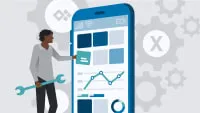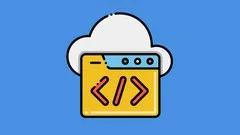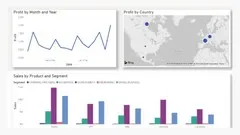
Power Apps: Building Data-Driven Apps 
Power Apps enables users to create data-driven business applications by combining the power of Excel and Power Apps. This course provides an introduction to the tools and techniques needed to build powerful, data-driven apps. ▼
ADVERTISEMENT
Course Feature
![]() Cost:
Cost:
Free Trial
![]() Provider:
Provider:
LinkedIn Learning
![]() Certificate:
Certificate:
No Information
![]() Language:
Language:
English
Course Overview
❗The content presented here is sourced directly from LinkedIn Learning platform. For comprehensive course details, including enrollment information, simply click on the 'Go to class' link on our website.
Updated in [March 06th, 2023]
This course provides an overview of Power Apps and how to use it to build data-driven applications. Participants will learn how to connect one or more data sources in Power Apps, personalise the design, add images and buttons, validate user data, and auto-populate form fields. Additionally, participants will learn how to use Power Apps templates to save time and export app packages for distribution outside of their organization's Office 365 ecosystem. By the end of the course, participants will have the skills and knowledge to create and deploy their own data-driven applications.
[Applications]
After this course, participants can apply their knowledge to create data-driven apps for their organisation. They can use Power Apps to connect to one or more data sources, personalise the design, add images and buttons, validate user data, and auto-populate form fields. Participants can also use Power Apps templates to save time and export app packages for distribution outside of their organisation's Office 365 ecosystem.
[Career Paths]
1. Power Apps Developer: Power Apps developers are responsible for designing, developing, and deploying data-driven applications using Power Apps and Excel. They must have a strong understanding of the Power Apps platform and be able to create custom applications that meet the needs of their organization. They must also be able to troubleshoot and debug any issues that arise during the development process. As the demand for data-driven applications continues to grow, the need for Power Apps developers is expected to increase.
2. Power Apps Consultant: Power Apps consultants are responsible for helping organizations create and deploy data-driven applications. They must have a strong understanding of the Power Apps platform and be able to provide advice and guidance on how to best utilize the platform to meet the needs of their organization. They must also be able to troubleshoot and debug any issues that arise during the development process. As the demand for data-driven applications continues to grow, the need for Power Apps consultants is expected to increase.
3. Power Apps Administrator: Power Apps administrators are responsible for managing and maintaining the Power Apps platform. They must have a strong understanding of the Power Apps platform and be able to configure and manage the platform to meet the needs of their organization. They must also be able to troubleshoot and debug any issues that arise during the development process. As the demand for data-driven applications continues to grow, the need for Power Apps administrators is expected to increase.
4. Power Apps Designer: Power Apps designers are responsible for creating visually appealing and user-friendly data-driven applications. They must have a strong understanding of the Power Apps platform and be able to create custom applications that meet the needs of their organization. They must also be able to troubleshoot and debug any issues that arise during the development process. As the demand for data-driven applications continues to grow, the need for Power Apps designers is expected to increase.
[Education Paths]
1. Bachelor of Science in Computer Science: This degree path focuses on the fundamentals of computer science, including programming, software engineering, and data structures. It also covers topics such as artificial intelligence, machine learning, and computer networks. With the increasing demand for data-driven applications, this degree path is becoming increasingly popular and is a great way to gain the skills needed to develop and deploy data-driven applications.
2. Master of Science in Data Science: This degree path focuses on the analysis and interpretation of data, as well as the development of data-driven applications. It covers topics such as data mining, machine learning, and predictive analytics. With the increasing demand for data-driven applications, this degree path is becoming increasingly popular and is a great way to gain the skills needed to develop and deploy data-driven applications.
3. Bachelor of Science in Information Technology: This degree path focuses on the fundamentals of information technology, including networking, system administration, and database management. It also covers topics such as web development, mobile application development, and cloud computing. With the increasing demand for data-driven applications, this degree path is becoming increasingly popular and is a great way to gain the skills needed to develop and deploy data-driven applications.
4. Master of Science in Artificial Intelligence: This degree path focuses on the development of artificial intelligence systems, including natural language processing, computer vision, and robotics. It also covers topics such as machine learning, deep learning, and reinforcement learning. With the increasing demand for data-driven applications, this degree path is becoming increasingly popular and is a great way to gain the skills needed to develop and deploy data-driven applications.
Course Syllabus
Excel setup: Named tables
Store files in an accessible location
Connect Power Apps to data
Your first app: Default from existing data
Browse screen, edit screen, detail screen
Save and other app settings
Refresh the data source
Course Provider

Provider LinkedIn Learning's Stats at AZClass
Discussion and Reviews
0.0 (Based on 0 reviews)
Explore Similar Online Courses

Content Marketing: Marketing Techniques & Proven Strategies

Angular Fundamental Course for Absolute Beginners 2022

Python for Informatics: Exploring Information

Social Network Analysis

Introduction to Systematic Review and Meta-Analysis

The Analytics Edge

DCO042 - Python For Informatics

Causal Diagrams: Draw Your Assumptions Before Your Conclusions

Whole genome sequencing of bacterial genomes - tools and applications

Business Intelligence Analyst - Power BI Tableau

Create BI Reports with Power BI Using Excel Data

Fundamental Question on Business Intelligence
 Related Categories
Related Categories
 Popular Providers
Popular Providers
Quiz
 Submitted Sucessfully
Submitted Sucessfully
1. What is the main purpose of Power Apps?
2. What is the main benefit of using Power Apps?
3. What is the main focus of the course?
4. What is Power Apps?
Correct Answer: It is a platform to build data-driven apps.


Start your review of Power Apps: Building Data-Driven Apps